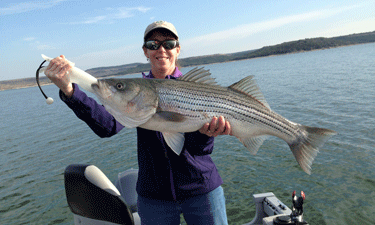 As director of the Plano, Texas, Parks and Recreation Department, Amy Fortenberry oversees 185 full-time employees and about 600 part-time employees in parks and recreation, plus another 40 full-time employees with the city’s convention and visitor’s bureau and “about a bazillion contractors,” she laughs. However, as a lifetime park and recreation professional who started her career in high school as a camp counselor, she understands the concerns of her employees at every level. She also makes a concerted effort to stay in touch by meeting with every new full-time employee upon hire, and she still teaches CPR and lifeguarding classes each year. We caught up with her to talk about her career, her experiences with NRPA’s PRORAGIS™ database and her advice for new park and recreation professionals just starting out in the field.
As director of the Plano, Texas, Parks and Recreation Department, Amy Fortenberry oversees 185 full-time employees and about 600 part-time employees in parks and recreation, plus another 40 full-time employees with the city’s convention and visitor’s bureau and “about a bazillion contractors,” she laughs. However, as a lifetime park and recreation professional who started her career in high school as a camp counselor, she understands the concerns of her employees at every level. She also makes a concerted effort to stay in touch by meeting with every new full-time employee upon hire, and she still teaches CPR and lifeguarding classes each year. We caught up with her to talk about her career, her experiences with NRPA’s PRORAGIS™ database and her advice for new park and recreation professionals just starting out in the field.
Parks & Recreation magazine: You started as a camp counselor when you were a teenager and then got your parks and recreation degree from Texas Tech University. What jobs have you had since then that led you to where you are today?
Amy Fortenberry: After college, I started in Grand Prairie as an athletic marketing specialist for four months before moving to Plano for a job as a recreation specialist. From that recreation position I became an aquatics supervisor, then aquatics superintendent, then recreation superintendent, then recreation services manager. Then we started succession planning because the longtime director before me was leaving, so a deputy director was selected, which was me. For six months, he directly mentored me before he retired, and I moved into the director position. That was in late 2008, and he left in April 2009.
P&R: What are some of your biggest struggles in your current position?
Fortenberry: This isn’t a great struggle — it’s just that we have a lot going on. Our citizens are incredibly engaged, which is a great thing, and they’re incredibly supportive. They also have very high expectations of what we provide, and that translates into them voting “yes” on bond projects. But that level of ownership and engagement also sometimes seems to slow down our progress. We have to find ways to balance that and change with the times.
P&R: I understand you have used PRORAGIS at your agency. What have you gotten out of this tool?
Fortenberry: It’s kind of like the old standards, but what’s good about PRORAGIS is that you can pick out those that you want to compare to. We’re on the cutting edge of certain things, and we want to see where we stand in terms of facilities, but we also know we’re not the going to be the same as a park district in Illinois. PRORAGIS helps us make deliberate decisions of what we’re going to offer and what relates back to our strategic plan, mission and vision statement. Plano has been an early adopter of a lot of these things, and we try to support NRPA’s initiatives. However, PRORAGIS is only going to be as good as the information that goes into it, so the more people that participate, the better the tool gets.
P&R: What advice do you have for those just entering the field?
Fortenberry: Be willing to try something you’re not incredibly comfortable with, and raise your hand for the jobs that people don’t want to do. People notice. When I was at that entry-level position as a recreation specialist, somebody came around and said, “We need a CPR instructor.” I was the new kid and thought, “I’m not going to teach CPR — somebody else should do it who’s more qualified.” But no one raised their hand, so I did and said I’d try it. A few months later, the aquatics supervisor job opened up, and because I was a CPR instructor and a lifeguard, I was qualified. It opened a door I didn’t expect to have opened to me. I think back to that day, and if I hadn’t hesitantly raised my hand, I wouldn’t have become an aquatics supervisor or superintendent or everything else that happened after. I didn’t realize it at the time, but it was really a pivotal point in my career. I had some lucky things happen along the way, but you have to take advantage of those opportunities.
Danielle Taylor is the Executive Editor of Parks & Recreation magazine.

